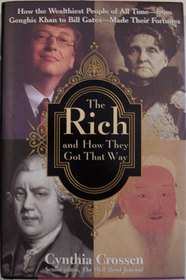Search -
The Rich and How They Got That Way: How the Wealthiest People of All Time--from Genghis Khan to Bill Gates--Made Their Fortunes
The Rich and How They Got That Way How the Wealthiest People of All Timefrom Genghis Khan to Bill GatesMade Their Fortunes
Author:
What does Bill Gates have in common with Genghis Khan, the thirteenth-century conqueror who wanted to own the world but settled for just five million square miles? — Or, for that matter, what does Gates have to do with Pope Alexander IV, whom historians describe as a scoundrel, saint, charlatan, and samaritan? Or Richard Arkwright, the eighteenth... more »
Author:
What does Bill Gates have in common with Genghis Khan, the thirteenth-century conqueror who wanted to own the world but settled for just five million square miles? — Or, for that matter, what does Gates have to do with Pope Alexander IV, whom historians describe as a scoundrel, saint, charlatan, and samaritan? Or Richard Arkwright, the eighteenth... more »
ISBN-13: 9780812932676
ISBN-10: 0812932676
Publication Date: 7/18/2000
Pages: 320
Rating: ?
ISBN-10: 0812932676
Publication Date: 7/18/2000
Pages: 320
Rating: ?
0 stars, based on 0 rating
Genres:
- Biographies & Memoirs >> General
- Biographies & Memoirs >> People, A-Z >> ( G ) >> Gates, Bill
- Business & Money >> General
- Business & Money >> Personal Finance >> General
- Business & Money >> Business Development & Entrepreneurship >> Entrepreneurship




